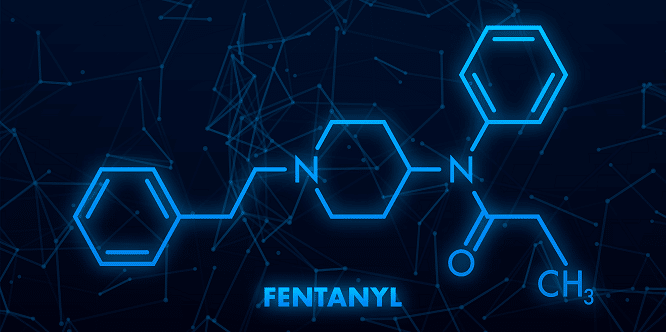TAKEAWAY: The opioid crisis in North America continues to balloon, much of it driven by fentanyl. According to CDC data, deaths involving synthetic opioids other than methadone (primarily fentanyl) have continued to rise, with 56,516 overdose deaths reported in 2020. Canada has a fentanyl problem of its own. Of all accidental overdose deaths in the first quarter of 2022, 85% involved fentanyl.
Jump Ahead
- What is fentanyl, and how does it work?
- How is fentanyl abused and what are the risks associated with it?
- What are the signs of fentanyl abuse, and what should you do if you suspect someone is abusing it?
- How can fentanyl addiction be treated, and what are the long-term effects of abuse?
- How can you prevent fentanyl abuse in your workplace?
- You May Also Be Interested In…
What is fentanyl, and how does it work?
Fentanyl is a synthetic opioid used legally to treat severe pain and is often prescribed following surgery. However, it is also produced and used illegally. It is also often prescribed to patients suffering chronic pain who may have become tolerant to other opioids. Scientists believe fentanyl to be 20 to 40 times more potent than heroin and 100 times more powerful than morphine.
Like other opioids, fentanyl binds to the body’s opioid receptors in the central nervous system, which controls pain and emotions. It reduces feelings of pain by interrupting the way nerves signal pain between the brain and the body. However, over time it can also change how the brain works, reducing sensitivity and creating a dependence on the drug.
Fentanyl can be prescribed as an injection, a skin patch, or as lozenges that are sucked like cough drops. Illegally produced synthetic fentanyl is produced in labs and is usually sold as a powder, dropped onto blotter paper, put in eye droppers and nasal sprays, or made into pills.
How is fentanyl abused and what are the risks associated with it?
Illegal fentanyl is both cheap to produce and much more potent than other street drugs. It is also difficult to detect and can look exactly like prescription medication. All of this also makes it far more dangerous. Drug dealers often mix fentanyl with other drugs, such as heroin, to increase their effectiveness and because it is odourless and tasteless, users may not even realize they are taking it. The drug dealers who produce synthetic fentanyl seldom know or control how much fentanyl goes into each pill so users cannot be sure of what they are taking.
Because of its potency, the risk of accidental overdose is high with fentanyl. And even small amounts of this drug can be lethal. In a recent study, the U.S. Drug Enforcement Administration found that 42% of pills tested for fentanyl contained at least 2 mg of fentanyl, considered a potentially lethal dose.
What are the signs of fentanyl abuse, and what should you do if you suspect someone is abusing it?
A worker abusing fentanyl may exhibit signs of paranoia, social withdrawal, lack of motivation, delusions and personality changes. They may also become increasingly impulsive.
Some of the physical symptoms include:
- Confusion
- Depression
- Difficulty walking
- Muscle stiffness
- Slowed or altered heart rate
- Laboured breathing
- Weakness
- Dizziness, light-headedness and fainting
- Shaking
- Sleepiness
- Slurred speech
- Swollen arms and legs
- Weight loss
- Visual hallucinations
- Nausea and vomiting
- Itching and scratching
- Pinpoint pupils
If you suspect someone is abusing fentanyl there are several things, you can and should do.
- Document everything, including complaints and anecdotes from fellow workers and observations from supervisors.
- Meet with the employee in person and note any apparent signs of use or intoxication.
- Have a supervisor or HR representative observe the employee directly.
- Remove the suspected user from any safety-sensitive position that could put themselves or others at risk.
If reasonable suspicion of use is determined, arrange for immediate testing.
How can fentanyl addiction be treated, and what are the long-term effects of abuse?
Fentanyl abuse can result in devasting long-term mental and physical effects, some of which can be irreversible. Workers may show poor judgement and mood swings, have difficulty controlling impulsive behaviour or develop depression or suicidal thoughts. Ironically, long-term fentanyl use can actually worsen pain in some patients, particularly if taken at high doses. Because of its potency, the risk of overdose and death is much higher with fentanyl than with other drugs. Physically, there are numerous long-term effects, including:
Risk of anoxic injury or damage to body tissues from decreased oxygen supply
- Multiple organ system damages
- Poor nutrition and weight loss
- Insomnia
- Sexual dysfunction
- Irregular menstruation
How can you prevent fentanyl abuse in your workplace?
Employers should start by helping remove the stigma surrounding addiction to encourage workers to seek help when needed. They can also foster an accepting workplace environment by integrating substance misuse prevention into existing workplace health and wellness programs, providing access to confidential screening tools and supports and educating workers on healthy ways to manage pain and stress.
Other ways employers can help to prevent fentanyl abuse in the workplace include:
- Reducing injury risk through education and other controls
- Sponsoring take-back events to encourage workers to dispose of unused prescriptions and not share them with fellow workers
- Purchasing naloxone to have on-site and train supervisors and others in how to use it
- Ensuring health benefits and easy access to Employee Assistance Programs (EAPs)
- Monitoring workers’ compensation claims for the possible need for pain education
- Tailoring health and wellness programs to tackle substance abuse directly and include education on the effects of fentanyl as well as the signs of addiction
- Training supervisors to recognize possible signs of fentanyl misuse, addiction and overdose

Add Fentanyl to Your Testing Process
Fentanyl can be tested for as an add-on to any of the following SureHire tests: Urine Express Panel 5, 8 or 13; Urine Lab Based 5, 8 or 13; or Oral Fluid Lab Based 8 or 13.
SureHire can also provide additional assistance to employers through education, training, and support, including reasonable suspicion training for supervisors.
You May Also Be Interested In…
- Do You Have Reasonable Suspicion?
 Employers cannot initiate reasonable suspicion testing without first going through the 5-step process. Reasonable suspicion training provides critical information about how to initiate reasonable suspicion testing, including the 5-step process and other tools that employers can use to help manage the misuse of alcohol and drugs in the workplace.
Employers cannot initiate reasonable suspicion testing without first going through the 5-step process. Reasonable suspicion training provides critical information about how to initiate reasonable suspicion testing, including the 5-step process and other tools that employers can use to help manage the misuse of alcohol and drugs in the workplace. - An Employer’s Guide: What You and Your Employees Need to Know About DOT Drug & Alcohol Testing
 When implementing or maintaining DOT Drug & Alcohol testing, there are key areas that employers should consider.
When implementing or maintaining DOT Drug & Alcohol testing, there are key areas that employers should consider. - SureHire Occupational Testing Acquires COHR Health: A Positive Step Towards Safe, Healthy, Productive Workforces and Communities
 We are thrilled to announce that today, May 6, 2024, SureHire Occupational Testing has officially acquired COHR Health, a well-known leader in occupational health services. Read on…
We are thrilled to announce that today, May 6, 2024, SureHire Occupational Testing has officially acquired COHR Health, a well-known leader in occupational health services. Read on… - Occupational Testing Use Case – Mining
 In this case study, we will explore how mining companies can use various types of occupational tests to reduce Total Recordable Incident Rates (TRIR) long term.
In this case study, we will explore how mining companies can use various types of occupational tests to reduce Total Recordable Incident Rates (TRIR) long term. - 9 Strategies to Keep Workers Cool on Drilling Sites During Hot Summer Months
 This article delves into strategies to keep workers cool and safe on drilling sites during the hot summer months.
This article delves into strategies to keep workers cool and safe on drilling sites during the hot summer months. - Hearing Conservation Basics: How to Manage Occupational Noise
 Learn how to proactively mitigate occupational noise risks and help prevent NIHL among workers.
Learn how to proactively mitigate occupational noise risks and help prevent NIHL among workers.


